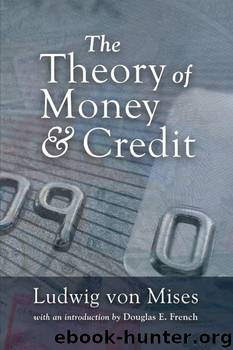The Theory Of Money And Credit by Ludwig Von Mises

Author:Ludwig Von Mises [Mises, Ludwig Von]
Language: eng
Format: epub
Publisher: Yale University Press
§ 4
Deposits as the Origin of Circulation Credit
Fiduciary media have grown up on the soil of the deposit system; deposits have been the basis upon which notes have been issued and accounts opened that could be drawn upon by cheques. Independently of this, coins, at first the smaller and then the medium-sized, have developed into fiduciary media. It is usual to reckon the acceptance of a deposit which can be drawn upon at any time by means of notes or cheques as a type of credit transaction and juristically this view is, of course, justified; but economically, the case is not one of a credit transaction. If credit in the economic sense means the exchange of a present good or a present service against a future good or a future service, then it is hardly possible to include the transactions in question under the conception of credit. A depositor of a sum of money who acquires in exchange for it a claim convertible into money at any time which will perform exactly the same service for him as the sum it refers to has exchanged no present good for a future good. The claim that he has acquired by his deposit is also a present good for him. The depositing of the money in no way means that he has renounced immediate disposal over the utility that it commands.
Therefore the claim obtained in exchange for the sum of money is equally valuable to him whether he converts it sooner or later, or even not at all; and because of this it is possible for him, without damaging his economic interests, to acquire such claims in return for the surrender of money without demanding compensation for any difference in value arising from the difference in time between payment and repayment, such, of course, as does not in fact exist. That this could be so repeatedly overlooked is to be ascribed to the long- and widely-accepted view that the essence of credit consists in the confidence which the lender reposes in the borrower. The fact that anybody hands money over to a bank in exchange for a claim to repayment on demand certainly shows that he has confidence in the bank’s constant readiness to pay. But this is not a credit transaction, because the essential element, the exchange of present goods for future goods, is absent. But another circumstance that has helped to bring about the mistaken opinion referred to is the fact that the business performed by banks in exchanging money for claims to money payable on demand which can be transferred in the place of money, is very closely and intimately connected with that particular branch of their credit business that has most influenced the volume of money and entirely transformed the whole monetary system of the present day, namely, the provision of circulation credit. It is with this sort of banking business alone, the issue of notes and the opening of accounts that are not covered by money, that we are concerned.
Download
This site does not store any files on its server. We only index and link to content provided by other sites. Please contact the content providers to delete copyright contents if any and email us, we'll remove relevant links or contents immediately.
International Integration of the Brazilian Economy by Elias C. Grivoyannis(57436)
The Radium Girls by Kate Moore(10934)
Turbulence by E. J. Noyes(7068)
Nudge - Improving Decisions about Health, Wealth, and Happiness by Thaler Sunstein(6651)
The Black Swan by Nassim Nicholas Taleb(6222)
Pioneering Portfolio Management by David F. Swensen(5624)
Rich Dad Poor Dad by Robert T. Kiyosaki(5177)
Zero to One by Peter Thiel(4846)
Man-made Catastrophes and Risk Information Concealment by Dmitry Chernov & Didier Sornette(4764)
Secrecy World by Jake Bernstein(3795)
Millionaire: The Philanderer, Gambler, and Duelist Who Invented Modern Finance by Janet Gleeson(3585)
Skin in the Game by Nassim Nicholas Taleb(3489)
The Age of Surveillance Capitalism by Shoshana Zuboff(3437)
The Money Culture by Michael Lewis(3300)
Skin in the Game: Hidden Asymmetries in Daily Life by Nassim Nicholas Taleb(3280)
Bullshit Jobs by David Graeber(3196)
The Dhandho Investor by Mohnish Pabrai(3182)
The Wisdom of Finance by Mihir Desai(3097)
Blockchain Basics by Daniel Drescher(2902)
